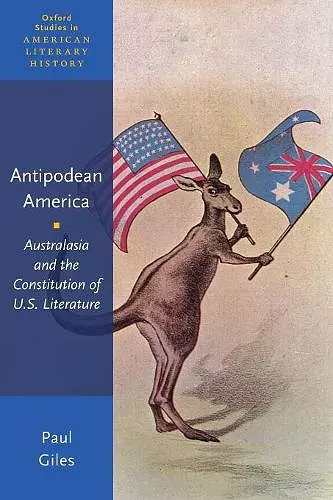Antipodean America
Australasia and the Constitution of U. S. Literature
Format:Paperback
Publisher:Oxford University Press Inc
Published:24th Nov '16
Currently unavailable, and unfortunately no date known when it will be back
This paperback is available in another edition too:
- Hardback£82.00(9780199301560)

Although North America and Australasia occupy opposite ends of the earth, they have never been that far from each other conceptually. The United States and Australia both began as British colonies and mutual entanglements continue today, when contemporary cultures of globalization have brought them more closely into juxtaposition. Taking this transpacific kinship as his focus, Paul Giles presents a sweeping study that spans two continents and over three hundred years of literary history to consider the impact of Australia and New Zealand on the formation of U.S. literature. Early American writers such as Benjamin Franklin, Thomas Jefferson, Joel Barlow and Charles Brockden Brown found the idea of antipodes to be a creative resource, but also an alarming reminder of Great Britain's increasing sway in the Pacific. The southern seas served as inspiration for narratives by Washington Irving, Edgar Allan Poe, and Herman Melville. For African Americans such as Harriet Jacobs, Australia represented a haven from slavery during the gold rush era, while for E.D.E.N. Southworth its convict legacy offered an alternative perspective on the British class system. In the 1890s, Henry Adams and Mark Twain both came to Australasia to address questions of imperial rivalry and aesthetic topsy-turvyness. The second half of this study considers how Australia's political unification through Federation in 1901 significantly altered its relationship to the United States. New modes of transport and communication drew American visitors, including novelist Jack London. At the same time, Americans associated Australia and New Zealand with various kinds of utopian social reform, particularly in relation to gender politics, a theme Giles explores in William Dean Howells, Charlotte Perkins Gilman, and Miles Franklin. He also considers how American modernism in New York was inflected by the Australasian perspectives of Lola Ridge and Christina Stead, and how Australian modernism was in turn shaped by American styles of iconoclasm. After World War II, Giles examines how the poetry of Karl Shapiro, Louis Simpson, Yusef Komunyakaa, and others was influenced by their direct experience of Australia. He then shifts to post-1945 fiction, where the focus extends from Irish-American cultural politics (Raymond Chandler, Thomas Keneally) to the paradoxes of exile (Shirley Hazzard, Peter Carey) and the structural inversions of postmodernism and posthumanism (Salman Rushdie, Donna Haraway). Ranging from figures like John...
Antipodean America provides a constellation of previously unknown facts about American history... I cannot but admire Giles for the sheer breadth of his investigation... [B]y the end of the book, I wished Giles had written more than the almost six hundred pages of Antipodean America. * Journal of American History *
Giles possesses an uncanny ability to mount a paradigmatic, discipline-altering argument while giving convincing, interesting close readings of books and careers, a feature that makes this book at once not just an interpretively dazzling performance but a book that teacher and student can have ready at hand, to consult for reference, and, since the book is written with flair and elegance, delight. * Nicholas Birns, Journal of the Association for the Study of Australian Literature *
This original and deeply learned work by Paul Giles continues to expand his unique project of global inquiry, from which we all have much to learn. * David Hackett Fischer, author of Fairness and Freedom: A History of Two Open Societies, New Zealand and the United States *
With incisive readings anchored in history and biography, Antipodean America is an invaluable encyclopedic resource for scholars not only of U.S. culture but also the cultures of Australia, New Zealand, and Britain * as well as scholars interested in transnationalism more broadly. Giles adds a rich dimension to transnational studies of U.S. literature and its Pacific world coordinates.Laura Doyle, author of Freedom's Empire: Race and the Rise of the Novel in Atlantic Modernity, 1640-1940 *
Locating US colonial legacies as well as US imperialism within a heterogeneous set of power relations that destabilizes one-dimensional conceptions of transpacific and transatlantic exchange, Antipodean America highlights the Pacific and specifically Australia as rich fields of multidirectional reciprocity that have been deeply impactful on US literary and cultural development. * American Literature *
ISBN: 9780190623999
Dimensions: 155mm x 234mm x 43mm
Weight: 850g
592 pages